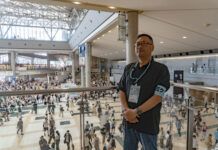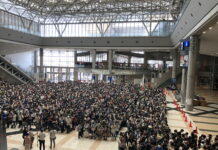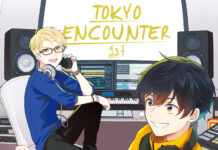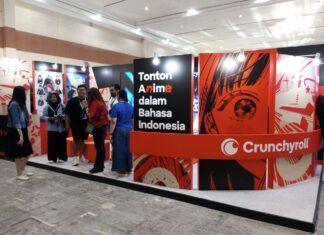
Would you tell us how is the Comiket planned? How do you coordinate with external parties?
We always coordinate with parties such as the train station and the police department. We ask for their help, then they cooperate with us.
As for volunteers, there are three thousand volunteers in Comiket. We usually have a meetup to gather them then we explain the general concept of Comiket. Then they are divided into smaller teams which remain until the day of event. Of course they should do it professionally.
These volunteers, they are those who like anime so much, and they liked manga. Because they have a passion, they always work enthusiastically; they don’t slack around. They don’t return home early, but they stayed until late night with utmost dedication. They have immense passion in them.
The volunteer with professional ethics, we find this to be very interesting.
Yes, the main requirement to become a volunteer is to have a tremendous sense of care. They should work seriously and really love what they’re doing. If they already have that much sense of care, they will serve us with passion.
Regarding this year’s Winter Comiket (Comiket 93), when does the preparation start?
We already have the blueprint from a year ago. The actual work is conducted as soon as Summer Comiket (C92) had finished. So, after this Comiket is over, we open the circles registration. Then, we coordinate with the relevant parties, with the corporate booths; so all the details are already decided in October.
Coordinating the meetup schedule of the volunteers is a bit hard; we have volunteers from a diverse background, from high schoolers, college students, to office workers. But we can do it in the end.
What is the position of Comiket in the world?
I don’t want to brag, but Comiket is the starting point. Doujinshi is from Japan, so this event is for Japanese only at the beginning. But the participants are increasing, people from overseas started coming, and the event became bigger. We want to make people enjoy, especially fans of Eastern Asia culture, and we will keep doing so. We want to create the greatest matsuri in the world, a place where everyone can enjoy the event.
Are there any restrictions or special regulations from the Japanese government?
We don’t have anything like that. There is the 2020 Olympics coming, but nothing has been set on stone.
Comiket actually has many other things, but why do people overseas associate doujinshi with porn books?
Really, there is no limitation regarding what to sell in Comiket. You can bring any interesting things from your country, from America, from Indonesia. As long as you obey the Comiket rules.
We value creativity as an important thing. We want Comiket to be a tanoshii (fun) experience for everyone. You can buy and sell practically anything in Comiket.
That’s right, we saw railway-themed books being sold in Comiket.
Yes, as long as the content doesn’t violate the government regulation, that’s okay. We hope by selling such kind of books, they (the circle) can meet new people and make friends with those who share the same hobby.
We saw the tetsuya-gumi (people who stay overnight near the venue). It has been prohibited by Comiket, but why do people keep staying overnight?
We always say this every year regarding staying overnight near Tokyo Big Sight, but they never listen to us. So we try to arrange measures to ensure they don’t bother the neighborhood. Even though Japan is a very safe country, the chances of crime is not zero.
For those reading this, don’t you feel wasteful, staying from the night before, entering the venue in the time not very different from those people who arrive on the first train, then after you got what you wanted, you feel tired at 11 and you don’t get to enjoy the event?
Isn’t it better, to arrange the plan with your friends through social media (Twitter), then come early that day with train, divide the job to get the desired items, then after everybody get them, you can enjoy the event together with your friends until the closing time. We want everyone to enjoy Comiket.
Lastly, we have reported from anime events overseas. But why do Comiket has photography restrictions, with the need to obtain clearance first, even though there are so many human interest moments in Comiket.
I can understand that. In overseas events, people are freely expressing themselves. Maybe there are some people who are very happy if their faces got published in mass media. But Japanese highly values privacy, they don’t want their boss, co-worker, their families, found out that they are in Comiket. This hobby, even if it’s in the public space, is a very personal thing for them. That’s why you need some permission to shoot the pictures.
The Indonesian Anime Times | Reporting and photography by Kevin W








